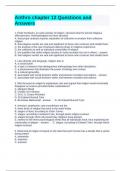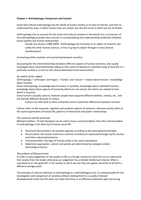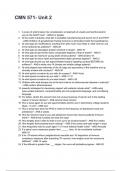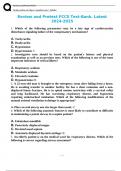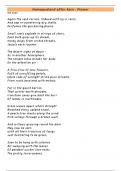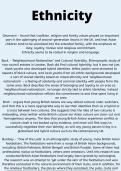Answers
1. Émile Durkheim, an early scholar of religion, stressed what he termed religious
effervescence. Anthropologists too have stressed
A. that proper analysis requires separation of collective re-creation from collective
religion.
B. that religious worlds are real and significant to those who construct and inhabit them.
C. the analysis of the use of behavior-altering drugs in religious experience.
D. the collective as well as individual universality of religion.
E. the qualities that make religion present in some societies but not in others. - answer
B. that religious worlds are real and significant to those who construct and inhabit them.
2. Like ethnicity and language, religion also is
A. a social fiction.
B. a topic of research that distinguishes anthropology from other disciplines.
C. a phenomenon that illustrates the power of biology over culture.
D. a cultural generality.
E. associated with social divisions within and between societies and nations. - answer
E. associated with social divisions within and between societies and nations.
3. Who focused on religion's explanatory role and argued that religion would eventually
disappear as science provided better explanations?
A. Margaret Mead
B. Claude Lévi-Strauss
C. Sir E. E. Evans-Pritchard
D. Sir Edward Burnett Tylor
E. Bronislaw Malinowski - answer D. Sir Edward Burnett Tylor
4. Animism, polytheism, and monotheism are the
A. three kinds of religion that exist in the world today.
B. stages of ritual, according to Victor Turner.
C. stages, according to Edward Tylor, through which religion evolved.
D. stages through which all present-day religions have passed.
E. names for the three psychological needs that all individuals have, thus explaining the
universality of religion. - answer C. stages, according to Edward Tylor, through which
religion evolved.
5. What kind of religion is based on the idea that each human has a double that is active
during sleep?
A. animatism
B. totemism
C. animism
, D. mana
E. polytheism
Answer: C - answer C. animism
6. Besides animism—and sometimes coexisting with it in the same society—there is a
view of the supernatural as a domain of raw impersonal power, or force, that people can
control under certain conditions. This conception of the supernatural is particularly
prominent in Melanesia. Melanesians refer to this force as
A. taboo.
B. magic.
C. good (or bad) luck.
D. The Force.
E. mana. - answer E. mana.
7. What term refers to the manipulation of the supernatural to accomplish specific
goals?
A. animism
B. magic
C. religion
D. a rite of passage
E. pantheism - answer B. magic
8. ________ magic is based on the belief that whatever is done to an object will affect a
person who once had contact with it.
A. Contagious
B. Imitative
C. Serial
D. Sequential
E. Simultaneous - answer A. Contagious
9. Religion and magic don't just explain things and help people accomplish goals—they
also enter the realm of human feelings. In other words,
A. they serve emotional needs as well as cognitive (i.e., explanatory) ones.
B. religion helps reduce differences by promoting brotherly love.
C. they determine the emotional well-being of all their practitioners.
D. they often lead to extreme psychological disruption and even mental illness.
E. they are psychologically and cognitively relevant, but these realms are well contained
and have no effect beyond the mental well-being of the practitioner. - answer A. they
serve emotional needs as well as cognitive (i.e., explanatory) ones.
10. Bronislaw Malinowski found that the Trobriand Islanders used magic when sailing, a
hazardous activity. He proposed that
A. people turn to magic to instill psychological stress on their competitors, especially
when the fish supply is very low.
B. magic actually reduced the fishing success of the Trobriand Islanders, but at least
they did not feel directly responsible, since then they could blame it on bad luck.

